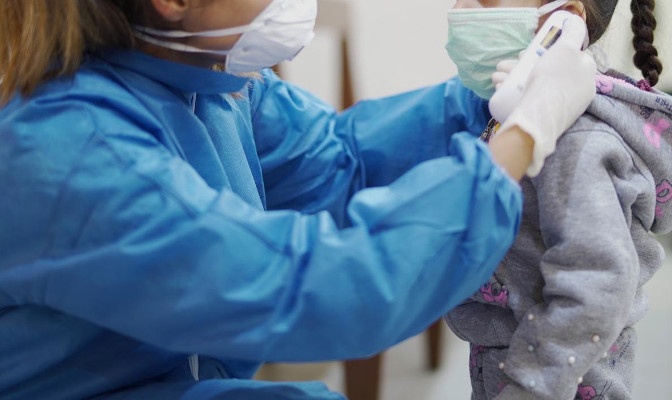
Meningitis in children: symptoms, diagnosis and prevention
Meningitis is a very frightening disease, because in severe cases it can even be fatal. And children are among those most at risk
Meningitis in children:
- what are the symptoms to recognise it
- what to do if you come into contact with an infected person
- how vaccinations against meningitis, the only effective weapon of prevention available today, work.
What are the symptoms that might lead one to suspect a case of meningitis? Why are children more at risk? And what meningitis vaccinations are available today?
Meningococcal meningitis: what is it?
Meningococcal meningitis is a serious disease characterised by infection of the meninges, the membranes that surround the brain and spinal cord.
It is caused by a bacterium, Neisseria Meningitidis, also known as meningococcus, of which there are several serotypes.
However, only 6 are responsible for invasive meningococcal disease: A, B, C, W, X and Y.
The serotypes circulating most frequently in Italy and Europe are B and C, while in Africa and Asia serotypes A, W and X are widespread and in the United States B, C and Y are also found.
Meningitis in children: how it is transmitted and who it affects
Transmission of the meningococcus bacterium takes place by air via respiratory tract secretions and saliva droplets.
It therefore requires close contact with the sick person, which is why it is more common in communities such as nurseries, schools, barracks and discos.
The bacterium cannot survive in the environment or in food, drink or on objects.
All ages are affected, but the prevalence is higher under 5 years of age (especially in children under 2 years of age), adolescents and young adults.
What are the consequences?
It is a very serious disease with rapid evolution, sometimes fulminating.
Although early diagnosis and appropriate treatment can lead to a cure, unfortunately 10-15% of affected children die.
If they survive, they can suffer very serious consequences such as
- mental retardation
- neurological deficits
- deafness.
Symptoms of meningitis in children
The disease has an incubation period of 2-10 days and patients should be considered infectious up to 24 hours after starting antibiotic treatment.
Symptoms may vary according to age, but the main symptoms should undoubtedly be alarming are
- high fever
- general malaise
- headache
- vomiting
- neck stiffness
- convulsive seizures and altered state of consciousness.
Additional alarm bells for meningitis, especially in children under one year of age, can be
- whining crying
- difficulty in feeding
- distressed appearance
- rounded anterior fontanel.
The appearance of petechiae (small red dots on the skin) or purpura (red-bluish spots on the skin of varying size) are signs of very serious general impairment.
What to do if you have been in contact with a person with meningitis
If you have been in contact with a person with meningitis, the first step is to promptly inform your doctor, who will prescribe a prophylactic antibiotic regardless of your age and immunisation status (i.e. even if you have been vaccinated).
Children’s health, vaccines against meningitis: types and coverage
Vaccines are the only effective preventive weapon against bacterial meningitis and the meningococcus that causes it.
There are currently 3 types of vaccines available
- the vaccine against type C meningitis
- type B meningitis vaccine
- tetravalent vaccine against serotypes A, C, W, Y.
The vaccine against meningococcus C is administered to all children aged between 13 and 15 months, but it is possible to give it in advance to those at higher risk.
The meningococcal B vaccine can be administered as early as the second or third month of life. The number of doses varies depending on the age at which administration begins.
Side effects of vaccines
The most common side effects following administration of the vaccine are: redness, swelling and pain at the injection site lasting 1-2 days.
Systemic reactions usually resolve after 2-3 days and are
- fever
- irritability
- drowsiness
- general malaise.
Allergic reactions of varying degrees can sometimes occur, up to, although very rarely, anaphylactic shock, which occurs within the first few minutes of inoculation of the vaccine and can be adequately treated if medical intervention is rapid.
It is therefore recommended to wait 15-20 minutes before leaving the facility where the vaccination was carried out.
Read Also:
First Case Of Meningitis Associated With SARS-CoV-2. A Case Report From Japan
Italian Girl Died Of Meningitis. She Was Returning From World Youth Day In Krakow


